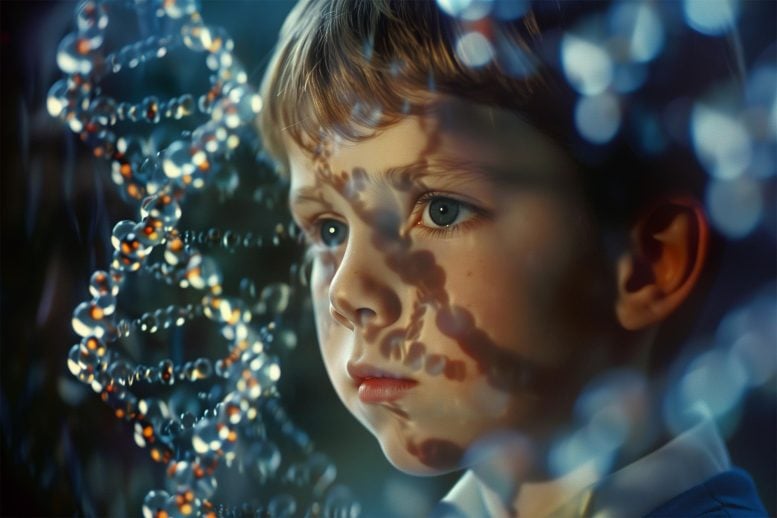
A Rutgers study reveals that peer social genetic effects—the impact of a social partner’s genotype on another’s observable traits—can affect the risk of developing addiction and psychiatric disorders later in life.
Mom always said, “Choose your friends wisely.” Now a study led by a Rutgers Health professor shows she was onto something: Their traits can rub off on you – especially ones that are in their genes.
The genetic makeup of adolescent peers may have long-term consequences for individual risk of drug and alcohol use disorders, depression, and anxiety, the groundbreaking study has found.
“Peers’ genetic predispositions for psychiatric and substance use disorders are associated with an individual’s own risk of developing the same disorders in young adulthood,” said Jessica E. Salvatore, an associate professor of psychiatry at the Rutgers Robert Wood Johnson Medical School and lead author of the study published in the American Journal of Psychiatry. “What our data exemplifies is the long reach of social genetic effects,” Salvatore said.
Socio-genomics – the influence of one person’s genotype on the observable traits of another – is an emerging field of genomics. Research suggests that peers’ genetic makeup may influence the health outcomes of their friends. To test this, Salvatore and colleagues used Swedish national data to assess peer social genetic effects for several psychiatric disorders.
Study Methodology and Findings
With an anonymized database of more than 1.5 million individuals born in Sweden between 1980 and 1998 to Swedish-born parents, the first step was to map individuals by location and by school during their teenage years. The researchers then used medical, pharmacy, and legal registries documenting substance use and mental health disorders for the same individuals in adulthood.
Models were run to assess whether peers’ genetic predispositions predicted target individuals’ likelihood of experiencing substance abuse, major depression, and anxiety disorder in adulthood. Peers’ genetic predispositions were indexed with family genetic risk scores – personalized measures of genetic risk based on family history – for the same conditions.
Even when controlling for factors such as the target individuals’ own genetic predispositions and family socioeconomic factors, the researchers found a clear association between peers’ genetic predispositions and target individuals’ likelihood of developing a substance use or psychiatric disorder. The effects were stronger among school-based peers than geographically defined peers.
Within school groups, the strongest effects were among upper secondary school classmates, particularly those in the same vocational or college-preparatory track between ages 16 and 19. Social genetic effects for school-based peers were greater for drug and alcohol use disorders than major depression and anxiety disorders.
Salvatore said more research is needed to understand why these connections exist.
“The most obvious explanation for why peers’ genetic predispositions might be associated with our own well-being is the idea our peers’ genetic predispositions influence their phenotype, or the likelihood that peers are also affected by the disorder,” she said. “But in our analysis, we found that peers’ genetic predispositions were associated with target individuals’ likelihood of disorder even after we statistically controlled for whether peers were affected or unaffected.”
What is clear, Salvatore said, is what the findings mean for interventions.
“If we want to think about how to best address these socially costly disorders, we need to think more about network-based and social interventions,” she said. “It’s not enough to think about individual risk.”
This research also underscores the importance of disrupting processes and risks that extend for at least a decade after attendance in school, Salvatore added. “Peer genetic influences have a very long reach,” she said.
Reference: “Peer Social Genetic Effects and the Etiology of Substance Use Disorders, Major Depression, and Anxiety Disorder in a Swedish National Sample” by Jessica E. Salvatore, Henrik Ohlsson, Jan Sundquist, Kristina Sundquist and Kenneth S. Kendler, 7 August 2024, American Journal of Psychiatry.
DOI: 10.1176/appi.ajp.20230358
The study was funded by the National Institutes of Health, the Swedish Research Council, and Avtal om Läkarutbildning och Forskning funding from Region Skåne.
2 Comments
Pretty much what we’ve known for hundreds of years, it’s rather much so obvious that I’ve met people who actually believed that mental illness was a contagious disease, and obviously, in a way, it certainly is. I read something that some Pope from hundreds of years ago had to say about it. That’s why psychopathic rulers create psychological problems among the masses.
Your friends can impact your future. Period. No need to bring genes into this too make it more scientific.